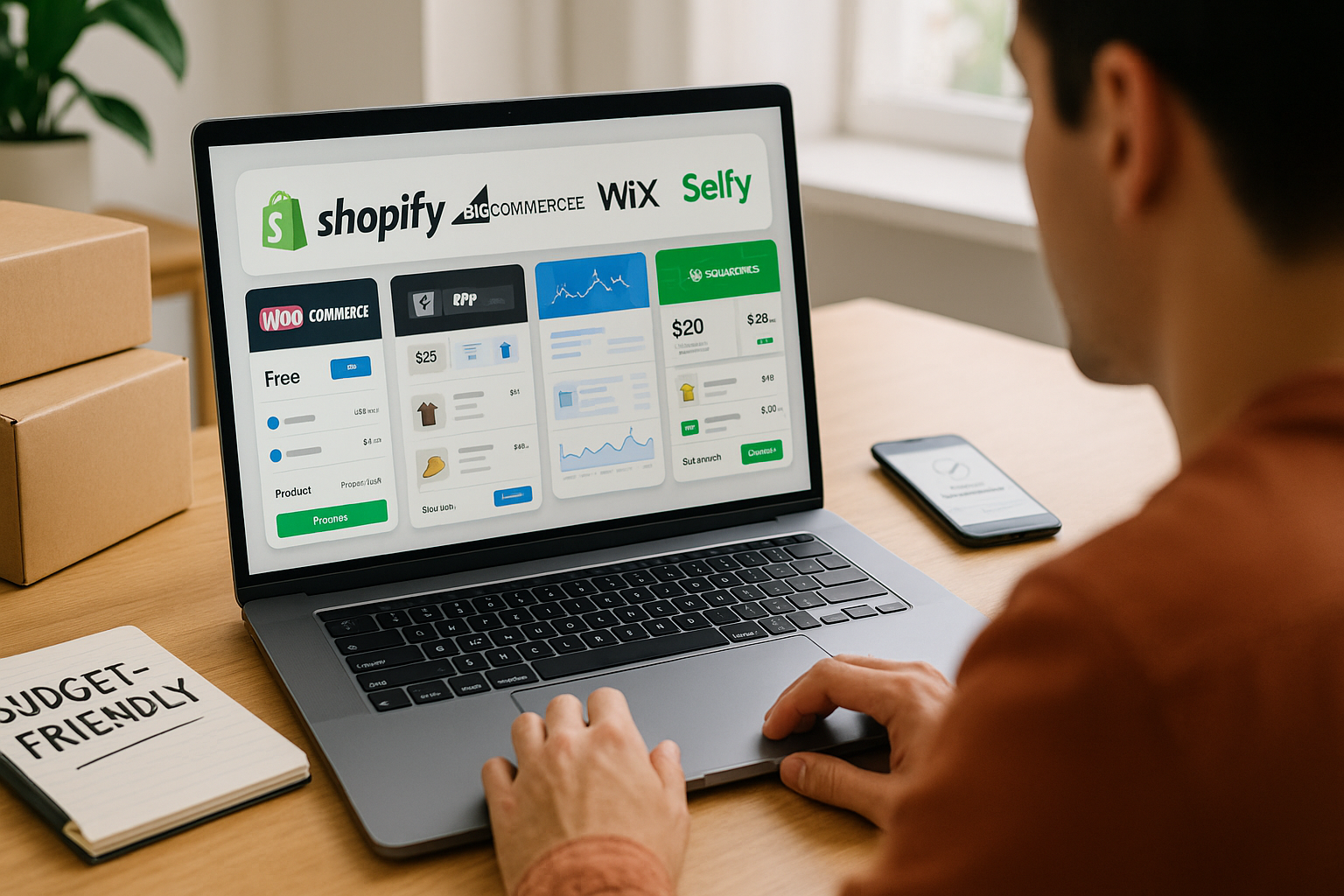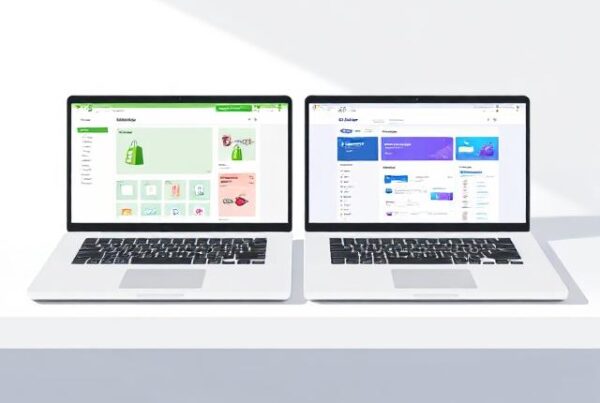According to Tapstitch, Shopify alternatives are becoming increasingly valuable in the booming drop shipping industry, which is projected to reach $476.1 billion by 2026. While Shopify remains popular, exploring other platforms can help you find solutions for your unique business needs and budget constraints.
When building a dropshipping business, finding Shopify alternatives for lower-cost drop shipping is essential for maximizing profits. Shopify offers many options with free plans or significantly lower fees than Shopify’s monthly subscription and transaction costs. The best Shopify alternatives also provide unique advantages like enhanced customization, better scalability, or specialized features designed specifically for dropshipping operations. With US-based suppliers typically shipping in 3-7 business days, choosing the right platform can significantly impact your customer experience.
This guide examines the Top 10 Shopify competitors for drop shipping, including Shopify alternatives like WooCommerce and PrestaShop, as well as robust options such as BigCommerce and Squarespace. Whether you’re just starting or looking to scale your existing operation, these platforms offer various advantages that might better serve your business goals than Shopify.
Why consider Shopify alternatives for dropshipping?

Despite Shopify’s popularity, many dropshipping entrepreneurs are discovering that the platform isn’t always the perfect fit for their business needs. Understanding the platform’s limitations can help you make a more informed decision about exploring Shopify alternatives for your dropshipping venture.
1. Shopify’s limitations for growing businesses
Shopify’s technical limitations surface as dropshipping scales. Strict upload limits for products and variants, and performance issues near 100,000 items, hinder growth.
Storage constraints, undisclosed in feature comparisons, pose another challenge. Limits on file numbers and sizes restrict expanding businesses. Scalability issues also impact international dropshippers needing multi-language support.
2. Cost concerns and transaction fees
The financial impact of using Shopify extends beyond the advertised monthly subscription fees. Here’s what you should consider:
- Transaction fees: As noted by Dropshipping.com, unless you exclusively use Shopify Payments, you’ll pay additional transaction fees (2% on Basic, 1% on Regular, and 0.5% on Advanced plans) for every sale.
- Currency conversion: When selling internationally, Shopify charges currency conversion fees of 1.5% for US-based stores and 2% for other regions.
- Hidden costs: While the basic monthly subscription starts at $29, adding necessary apps can quickly escalate your monthly expenses to $100 or more.
Many free Shopify alternatives don’t charge transaction fees, making them particularly appealing for dropshippers with thin profit margins. It can be crucial for new businesses where every dollar of profit matters.
3. Need for more customization and control.
For brand-focused dropshippers, Shopify’s limited customization is a major hurdle. The proprietary Liquid language restricts developers, making truly unique store designs challenging and often requiring specialized expertise.
Shopify’s data “lock-in” also limits long-term flexibility. Exporting store data is restricted to CSV files, leaving design and structure behind. Many Shopify alternatives offer greater data ownership and portability for future transitions.
How to evaluate a Shopify alternative

When evaluating the best Shopify alternatives for your dropshipping business, you need a systematic approach to find platforms that meet your needs. Looking beyond flashy marketing claims helps you identify options that enhance your business operations.
1. Pricing and transaction fees
The cost structure of ecommerce platforms can significantly impact your bottom line. Many Shopify alternatives offer more favorable pricing models:
- Transaction fees: According to Shopify’s blog, “Some platforms charge up to 7% per sale, while others, like BigCommerce and Volusion, have eliminated transaction fees.” For businesses processing $100,000 in annual sales, these fees can add $2,000-$2,900 to your costs.
- Subscription costs: Monthly plans range from free (WooCommerce, PrestaShop) to $299+ for advanced tiers. Consider whether features justify higher costs; Shopify’s higher-tier plans often cost three times more than comparable alternatives.
- Hidden expenses: Factor in theme costs ($ 0- $ 300+), app/extension fees ($0-$100+/month), domain registration ($10-20/year), and payment processing fees (1.5-3% + $0.30 per transaction).
2. Dropshipping integrations and automation
Effective automation capabilities save time and reduce errors. Look for platforms that offer:
- Automated order processing that routes customer orders directly to suppliers without manual intervention. It eliminates delays and gets products to customers faster.
- Inventory synchronization that provides real-time updates across multiple suppliers. It prevents selling out-of-stock items and maintains accurate product availability.
- Integration flexibility through apps or API connections. While apps offer easier setup for non-technical users, API integration provides more customization for specific business requirements.
3. Ease of use and customization
Usability is key for daily operations; prioritize intuitive interfaces and drag-and-drop builders to reduce reliance on developers. Open-source platforms generally offer greater design flexibility for evolving brand identity and differentiation. Crucially, ensure your chosen platform provides automatic mobile responsiveness for all devices.
4. Scalability and support
As your dropshipping expands, platform scalability is vital. Evaluate how each handles higher traffic, larger catalogs, and increased transactions, noting potential performance bottlenecks. Consider the platform’s ability to test new products risk-free, which is a key dropshipping advantage. Lastly, support options like 24/7 availability and community resources should be assessed for future growth challenges.
Top 10 Shopify Competitors for Dropshipping & E-Commerce Success
Looking for the best Shopify alternatives? These top 10 competitors offer powerful features, lower fees, and more flexibility. Whether in dropshipping, digital products, or custom stores, these platforms give you control, scalability, and tools to grow your e-commerce business fast.
1. WooCommerce: The Most Flexible Shopify Alternative for WordPress Lovers
WooCommerce is a free, open-source eCommerce plugin for WordPress that gives you full control over your online store. Unlike Shopify, a hosted solution, WooCommerce lets you build a fully customizable storefront using your hosting. It’s ideal for sellers who want flexibility, powerful features, and the freedom to scale without being locked into a monthly subscription model. Best part? It plays well with popular dropshipping tools and analytics plugins like Lifetimely, making it a Lifetimely alternative to Shopify for many users.
Shopify vs WooCommerce: Feature Comparison
| Feature | Shopify | WooCommerce |
| Hosting | Fully hosted | Self-hosted (user-managed hosting) |
| Customization | Limited (via theme editor) | Full (themes, plugins, custom code) |
| Dropshipping Support | Built-in via DSers, Oberlo | Via plugins (AliDropship, Spocket) |
| Analytics & Lifetimely | Native support | Available via plugin integration |
| Payment Gateways | 100+ supported | 100+ supported (via extensions) |
| SEO Tools | Basic built-in | WordPress-level SEO (Yoast, etc.) |
| Scalability | Great for small to medium businesses | Highly scalable (with the right setup) |
| Ownership | Shopify controls the backend | You own the full site & data |
Pricing
- WooCommerce Plugin: Free
- Hosting: Starts at $5–$15/month
- Premium Themes/Extensions: Optional (typically $30–$100 one-time or annually)
- Domain: ~$10/year
Total Estimated Monthly Cost: ~$10–$40/month (depends on setup). No forced monthly SaaS fees like Shopify’s $39 base plan.
Why WooCommerce Is a Great Shopify Alternative
WooCommerce gives users the kind of control Shopify doesn’t, making it a lifetime alternative to Shopify for those seeking more flexibility. You can tailor every inch of your store, from checkout flows to plugin ecosystems, without paying recurring platform fees. For WordPress users or developers, it offers a flexible and budget-friendly way to build a powerful eCommerce business. If you prioritize ownership, scalability, and customization, WooCommerce outshines Shopify easily.
Best For
- WordPress users want to turn a site into a store.
- Tech-savvy entrepreneurs who need total flexibility
- Dropshippers using plugins like Sprocket or Printful
- Brands focused on SEO, blogging, and content marketing.
- Businesses that want to integrate Lifetimely or advanced analytics manually
Drawbacks
- Requires technical know-how (setup, security, updates)
- No official support team (you rely on documentation/forums)
- It can get overwhelming with too many plugins.
- Not beginner-friendly if you’re unfamiliar with WordPress
Already using WordPress or want complete control of your eCommerce business? WooCommerce gives you the freedom that Shopify can’t. Try it today, it’s free to start!
2. BigCommerce: The Scalable Shopify Alternative for High-Growth Brands
BigCommerce is a hosted eCommerce platform built for scalability and performance, offering robust Shopify alternatives for drop shipping businesses with growth ambitions. Unlike Shopify, it doesn’t nickel-and-dime you for advanced features; many essentials like multi-currency, real-time shipping quotes, and SEO tools come built-in. It’s designed to handle growing inventories, traffic spikes, and multi-channel selling easily. If you’re aiming big (literally), BigCommerce is your Shopify exit ramp.
Shopify vs BigCommerce: Feature Comparison
| Feature | Shopify | BigCommerce |
| Hosting | Included (hosted) | Included (hosted) |
| Built-in SEO Tools | Basic SEO options | Advanced SEO (URL control, metadata) |
| Multi-Currency Support | Only on higher plans | Available on all plans |
| Dropshipping Support | Via apps (DSers, Spocket, etc.) | Via apps (Spocket, Modalyst, etc.) |
| Transaction Fees | Yes (unless using Shopify Payments) | None, even with 3rd-party gateways |
| Product Options & Variants | Limited (max 3 options) | Up to 600 SKUs per product |
| Omnichannel Selling | Strong (FB, IG, Amazon) | Built-in (FB, IG, TikTok, eBay) |
| Lifetimely & Analytics | Native & via apps | Available via integrations |
Pricing
- StanPlan Plan: $39/month. Ideal for new businesses needing essential features and a professional storefront.
- Plan: $105/month. Offers advanced tools, better analytics, and support for growing online stores.
- Pro Plan: $399/month. Designed for scaling businesses with high-volume sales, advanced reports, and lower transaction fees.
- Enterprise Plan: Custom pricing tailored for large companies needing custom integrations, support, and enterprise-grade infrastructure.
Zero transaction fees, even if you use PayPal, Stripe, or others. Pricing is similar to Shopify, but you get more advanced features up front.
Why BigCommerce Is a Great Shopify Alternative
BigCommerce offers more built-in features than Shopify, so there is no need to pay extra for basic capabilities like multi-currency, advanced SEO, or product filtering. Plus, it doesn’t punish you with transaction fees if you use third-party gateways. It’s better for fast-scaling brands or B2B sellers who want stability, flexibility, and power without stacking paid apps.
Best For
- High-volume or fast-scaling eCommerce brands
- B2B and wholesale businesses
- Sellers needing multi-currency or multi-store setups
- Marketers who want SEO and omnichannel tools out of the box
- Businesses avoiding Shopify’s transaction fee traps
Drawbacks
- More complex to set up than Shopify for beginners.
- Fewer free themes compared to Shopify’s theme store
- The App Store is not as deep as Shopify’s ecosystem.
- An expensive jump between plans based on revenue caps
Scaling fast or selling across multiple channels? BigCommerce gives you the freedom, features, and flexibility that Shopify locks behind a paywall. Try it and grow on your terms!
3. PrestaShop: The Open-Source Shopify Alternative for Ultimate Customization
PrestaShop is a powerful open-source eCommerce platform that offers complete control over your online store without monthly fees. Unlike Shopify’s hosted approach, PrestaShop lets you customize every aspect, from product management to checkout, with thousands of modules and themes. Perfect for businesses wanting flexibility, scalability, and zero platform lock-in.
Shopify vs PrestaShop: Feature Comparison
| Feature | Shopify | PrestaShop |
| Hosting | Included (hosted) | Self-hosted (your choice of host) |
| Customization | Limited to themes & apps | Fully customizable (code-level access) |
| Pricing Model | Monthly subscription | Free core software; pay only for hosting & modules |
| Product Variants | Limited options | Unlimited attributes & combinations |
| SEO Capabilities | Basic SEO features | Advanced SEO tools & full control |
| Payment Gateways | Built-in & app integrations | 250+ payment gateways supported |
| Dropshipping Support | Via apps (DSers, Oberlo, etc.) | Wide drop shipping modules are available |
| Data Ownership | Shopify controls the backend | You own your data & store |
Pricing
- PrestaShop software: Free to download
- Hosting: $5–$30/month, depending on provider
- Add-ons & themes: Optional, from $30 upwards
- Domain: ~$10/year
No monthly platform fees, you only pay for hosting and the extras you want.
Why PrestaShop Is a Great Shopify Alternative
PrestaShop shines when you want full control over your store’s look, functionality, and data, without being tied to a monthly subscription. It’s ideal for developers and business owners who want to build a unique experience that scales, without limitations on product variants or payment options. PrestaShop is a smart pick if you prefer owning your platform to renting Shopify’s.
Best For
- Businesses needing full customizability
- Sellers with complex product catalogs and variants
- Developers and agencies building tailored stores
- Merchants want complete data control.
- Entrepreneurs are ready to self-manage hosting and security
Drawbacks
- Requires technical knowledge for setup and maintenance
- No official 24/7 support (community-based help)
- Can get complex with many modules and customizations
- Hosting choice impacts speed and security.
Want complete freedom without Shopify’s subscription fees? Download PrestaShop, host your store, and build your eCommerce empire, with no limits or monthly lock-in.
4. Squarespace: The Best Shopify Alternative for Beautiful, All-in-One Stores
Squarespace isn’t just for portfolios anymore; it’s a sleek, all-in-one platform that lets you launch visually stunning online stores in minutes. Perfect for creators, artists, and small business owners, it combines design flexibility, built-in tools, and zero coding to make selling online stylish and stress-free. If Shopify overwhelms you with plugins and fees, Squarespace keeps it simple and stunning.
Feature Comparison: Shopify vs Squarespace
| Feature | Shopify | Squarespace |
| Design & Templates | Limited free themes; paid options | Award-winning, modern templates (free) |
| Ease of Use | Steeper learning curve | Beginner-friendly drag-and-drop editor |
| Built-In Marketing Tools | Requires apps (email, pop-ups, etc.) | Native email campaigns, pop-ups, and analytics |
| Digital Products Support | Needs apps for digital downloads | Built-in digital product sales |
| Customization (No Code) | Often requires Liquid code or apps | High flexibility without touching code |
| Blog Integration | Basic blog functionality | Full-featured blog, integrated seamlessly |
| Pricing Transparency | Add-ons and app costs add up | All-in-one, no hidden charges |
| Security & Maintenance | Shopify-managed | Squarespace-managed (no technical upkeep) |
Pricing
- Business Plan: $23/month (basic eCommerce)
- Commerce Basic: $27/month
- Commerce Advanced: $49/month
No extra costs for basic functions, what you see is what you pay.
Why Squarespace Is a Great Shopify Alternative
Squarespace empowers creators to build elegant stores with zero development hassle, positioning it among the best Shopify alternatives for ease of use. It offers built-in tools for SEO, blogging, and email, things Shopify locks behind apps. Squarespace delivers one of the cleanest, most integrated eCommerce experiences available for users who want to sell and tell stories.
Best For
- Creators, bloggers, photographers, and personal brands
- Stores with small to medium product catalogs
- Sellers focused on content, design, and simplicity.
- Service-based businesses or digital product sellers
Drawbacks
- Limited scalability for enterprise use
- Not ideal for high-SKU or dropshipping-heavy businesses
- Fewer third-party integrations compared to Shopify.
- Customization beyond templates requires developer help.
Design-focused? Content-driven? Skip the app overload, build your store with Squarespace, and start selling beautifully.
5. Ecwid: The Best Shopify Alternative for Adding eCommerce to Any Website
Ecwid stands out by turning any existing website into a fully functional online store, whether WordPress, Wix, or even a simple HTML page. You don’t need to rebuild your site or migrate platforms. Just plug it in, start selling, and let Ecwid handle the rest. If Shopify feels too bulky or requires a full store setup from scratch, Ecwid is your lightweight eCommerce secret weapon.
Feature Comparison: Shopify vs Ecwid
| Feature | Shopify | Ecwid |
| Platform Flexibility | Full website builder (must use Shopify) | Works with any website, no rebuild required |
| Ease of Setup | Requires full store setup | Add a store in minutes to existing sites |
| Free Plan | No free plan for full sales | 100% free plan for up to 5 products |
| Multi-Channel Selling | Needs apps for FB/Instagram integration | Native support for social, mobile, & marketplaces |
| POS Integration | Available via app | Built-in with select plans |
| Customization | Good, but limited without apps/devs | Customize without touching your existing site |
| Maintenance | Shopify-managed | Ecwid auto-updates across all sites |
| Digital Products | Requires apps | Built-in support |
Pricing
- Plan PlaPlan0 (up to 5 products)
- Venture Plan: $19/month
- Business Plan: $39/month
- UnlimPlan PlaPlan99/month
Most essential tools are included even in lower tiers. No mandatory app purchases.
Why Ecwid Is a Great Shopify Alternative
Ecwid gives you eCommerce superpowers without forcing you to abandon your current website, positioning it as a lifelong alternative to Shopify for seamless integration. Unlike Shopify, which requires building an entirely new store, Ecwid blends into your existing or multiple sites and syncs everything in one dashboard. It’s fast, flexible, and incredibly beginner-friendly.
Best For
- Small businesses or bloggers with existing websites
- WordPress, Wix, Weebly, or custom HTML site owners
- Sellers looking to test products without monthly commitments.
- Local stores want to sell online and in person
- Merchants who prioritize speed and multi-platform presence
Drawbacks
- Limited design control compared to full eCommerce platforms.
- Not ideal for complex product catalogs
- Fewer native marketing tools than Shopify
- Less suitable for large-scale inventory or B2B operations
Already have a site? Don’t start over; add Ecwid and start selling today. Easy, fast, and free to begin. Perfect for turning your site into a store, instantly.
6. Wix: The Most User-Friendly Shopify Alternative for Creative Control
Wix is a drag-and-drop website builder that has become a powerful eCommerce solution, offering Shopify alternatives for drop shipping businesses seeking design flexibility. It’s ideal for small to mid-sized companies looking for full design freedom without diving into code. If Shopify feels too rigid or plugin-heavy, Wix allows you to shape your store while offering the essential tools for growth, marketing, and selling online.
Feature Comparison: Shopify vs Wix
| Feature | Shopify | Wix |
| Design Flexibility | Predefined templates; limited drag-and-drop | Full drag-and-drop control; over 800 designer templates |
| Ease of Use | More technically, a learning curve for beginners | Extremely beginner-friendly interface |
| Built-in SEO & Marketing | Mostly via paid apps | Native tools for SEO, email marketing, and social ads |
| Blog & Content Tools | Basic blog | Integrated blog + content-first design tools |
| Video & Booking Features | Requires third-party integrations | Built-in bookings, video, and services tools |
| Multi-Channel Sales | Paid integrations needed | Native support for Facebook, Instagram, Amazon, etc. |
| AI Design Assistance | Not available | Wix ADI builds your store for you with AI |
| Mobile App Management | Yes | Yes (Wix Owner App with full eComm control) |
Pricing
- Business Basic: $27/month
- Business Unlimited: $32/month
- Business VIP: $59/month
All plans include hosting, templates, SSL, and basic marketing tools, with no surprise costs for must-have features.
Why Wix Is a Great Shopify Alternative
Wix offers unmatched creative freedom, allowing you to build a visually striking store that feels like your brand. Unlike Shopify, where customization often requires third-party apps or developers, Wix keeps everything beginner-friendly in-house. Wix balances flexibility and function better than most for creators, solopreneurs, and service-based sellers.
Best For
- Beginners who want total design control
- Freelancers, creatives, and service-based businesses
- Stores with under 300 products
- Sellers who care about branding, visuals, and content
- Users who wish to have everything (SEO, blog, CRM) in one tool
Drawbacks
- Not ideal for very large or complex eCommerce catalogs
- Less powerful inventory and fulfillment tools than Shopify
- Advanced SEO/custom code needs a developer workaround.
- Limited access to 3rd-party logistics or global tax compliance
Want an online store that looks exactly how you imagine it? Start with Wix and turn your vision into a powerful, personalized storefront, no coding needed.
7. Sellfy: The Best Shopify Alternative for Digital Product Creators
Sellfy is built for creators, such as digital artists, musicians, writers, and YouTubers, offering Shopify alternatives free of complex setups for selling digital goods. Unlike Shopify, which is designed for general commerce, Sellfy is tailored to sell digital products fast. You get everything you need in one place: hosting, storefront, marketing, and print-on-demand, without touching a single plugin. If you want simple, clean, and creator-focused, Sellfy’s your go-to.
Feature Comparison: Shopify vs Sellfy
| Feature | Shopify | Sellfy |
| Best for | Digital Products (requires paid apps) | Digital product sales |
| Ease of Setup | Complex setup, more steps | Store ready in minutes, no coding at all |
| Built-in Marketing Tools | Mostly app-based (email, discounts) | Built-in email marketing, upsells, discounts |
| Print-on-Demand | Requires third-party integrations | Native POD built-in, no extra tools needed |
| Selling on Social Media | Available via apps | Direct social selling via bio link + integrations |
| Video Streaming/Selling | Needs integrations | Stream & sell videos natively |
| Subscription Products | Available via app | Native recurring/subscription billing |
| Design Customization | Requires theme editing | Simple, clean design editor, no coding needed |
Pricing
- Plan PlaPlan0/month (limited to 10 products)
- Starter: $29/month
- Business: $79/month
- Premium: $159/month
Zero transaction fees on all plans include digital delivery, analytics, and built-in marketing.
Why Sellfy Is a Great Shopify Alternative
Sellfy is laser-focused on creators who sell digital products, subscriptions, or merch, and it removes all the fluff. No app stores, no complex setup, no hidden fees. It’s an out-of-the-box solution for anyone looking to start selling fast without worrying about tech hurdles. Shopify, by comparison, is overkill for most creators and expensive once you factor in app costs.
Best For
- Digital product creators (eBooks, courses, music, videos)
- YouTubers, influencers, podcasters, streamers
- Merch sellers using print-on-demand
- People selling subscriptions or memberships
- Creators who want to go live fast and simply
Drawbacks
- Limited design flexibility compared to full website builders
- Not built for physical inventory management or large catalogs
- Less suited for B2B or wholesale businesses
- Fewer integrations than Shopify’s massive app ecosystem
You create. Sellfy handles the rest. Start selling digital goods, subscriptions, or merch today, with no code, plugins, or stress.
8. Volusion: A Data-Driven Shopify Alternative for Analytical Sellers
Volusion is a long-standing eCommerce platform designed for sellers who love diving into numbers, making it one of the best Shopify alternatives for data-driven decisions. Unlike Shopify, which leans heavily on third-party apps for analytics and reporting, Volusion puts data front and center. It’s perfect for merchants who want more insights into customer behavior, product performance, and sales trends, right out of the box.
Feature Comparison: Shopify vs Volusion
| Feature | Shopify | Volusion |
| Advanced Analytics | Requires paid apps for deep analytics | Built-in real-time analytics, ROI tracking, heatmaps |
| Product Management | Efficient but app-dependent for bulk edits | Advanced native product editing and variant tools |
| CRM & Customer Insights | Basic customer data | Detailed customer history, segmentation, and CRM |
| Built-in SEO Tools | Requires apps/plugins | Powerful native SEO tools and keyword editing |
| Inventory Management | Good but plugin-enhanced | Centralized inventory control, low stock alerts |
| Design Customization | Theme-based, limited flexibility | Intuitive site builder with full layout control |
| One-Page Checkout | Available via plugin | Built-in one-page checkout for higher conversions |
| Support | 24/7 available but app-centric | E-commerce-specific support with account guidance |
Pricing
- Personal: $35/month
- Professional: $79/month
- Business: $299/month
No transaction fees. All plans include secure checkout, SEO tools, reporting, and product search.
Why Volusion Is a Great Shopify Alternative
Volusion is ideal for entrepreneurs who make data-driven decisions. It gives detailed customer insights, built-in analytics, and strong SEO tools without forcing you into expensive app ecosystems. While Shopify is great for plug-and-play solutions, Volusion offers more control and clarity over your store’s performance. It’s also better suited for sellers who want to optimize every click and conversion.
Best For
- Data-savvy entrepreneurs
- Sellers need in-depth customer tracking
- Businesses with growing product inventories
- Users who want detailed reporting without extra costs
- Sellers optimizing for SEO and performance
Drawbacks
- Design options are less flashy than those of competitors like Wix or Squarespace.
- It can feel dated compared to newer platforms.
- Slight learning curve for non-technical users
- Fewer third-party integrations compared to Shopify.
Want to know exactly how your store is performing at every step? Try Volusion, the eCommerce platform that speaks data fluently and helps you sell smarter.
9. Adobe Commerce: The Most Scalable Shopify Alternative for Enterprise Brands
Adobe Commerce (formerly Magento) is a powerhouse built for serious, high-growth businesses, offering features beyond basic Shopify alternatives and free options. Unlike Shopify, which focuses on simplicity and ease of use, Adobe Commerce thrives in complexity, giving you full control over your store’s architecture, design, features, and integrations. It’s open-source at heart but now supercharged by Adobe’s ecosystem, making it a go-to platform for enterprise-level customizations and scalability.
Feature Comparison: Shopify vs Adobe Commerce (Magento)
| Feature | Shopify | Adobe Commerce (Magento) |
| Customization & Flexibility | Limited to theme and app capabilities | Full-code access for total backend/frontend control |
| Multi-Store Management | Requires Shopify Plus | Native multi-store & multi-language capabilities |
| B2B Commerce Support | Only on Shopify Plus with limitations | Built-in B2B suite, quotes, custom pricing, portals |
| Scalability | Good for small-medium businesses | Enterprise-grade, handles millions of SKUs |
| Integration Capability | Relies on the app ecosystem | Seamless integration with ERPs, CRMs, PIMs, APIs |
| Hosting Options | Fully hosted by Shopify | Cloud-hosted (Adobe) or self-hosted (Magento Open Source) |
| Performance Optimization | Basic CDN & caching | Advanced caching, Varnish, custom deployment tools |
| Security & Compliance | PCI compliant by default | Full control over security protocols & compliance |
Pricing
- Magento Open Source: Free to use (self-hosted; development & hosting costs apply)
- Adobe Commerce Cloud: Starts at ~$22,000/year (varies by business size & GMV)
Magento Open Source is free, but you’ll need dev resources. Adobe Commerce Cloud is a full-featured enterprise solution with robust support and hosting.
Why Adobe Commerce Is a Great Shopify Alternative
Adobe Commerce beats Shopify when control, complexity, and customization are top priorities. Magento delivers if you’re managing thousands of products, want complete control over the backend, or need to build complex pricing models. It’s purpose-built for large businesses with developers who wish to go beyond limits. Shopify, on the other hand, feels like a walled garden in comparison.
Best For
- Enterprise-level companies
- B2B and wholesale operations
- Global brands with multiple storefronts
- Developers and agencies building custom features
- Businesses with high-volume transactions and SKUs
Drawbacks
- Steep learning curve, not for beginners
- Requires dedicated developer or agency support
- Expensive Adobe Commerce pricing for the hosted version
- Time-consuming setup and maintenance
Looking to build a store that scales with your ambition? Adobe Commerce gives you total freedom, enterprise muscle, and limitless flexibility. It’s not for everyone, but it might be perfect for you.
10. GoDaddy: The Easiest Shopify Alternative for Beginners and Solopreneurs
GoDaddy isn’t just about domains anymore; it’s evolved into a surprisingly capable eCommerce platform for small businesses. With its beginner-friendly interface and AI-powered website builder, GoDaddy helps entrepreneurs launch online stores fast, and no coding or tech expertise is required. If Shopify feels overwhelming or expensive, GoDaddy offers a lean, efficient, and cost-effective way to get selling online quickly.
Feature Comparison: Shopify vs GoDaddy
| Feature | Shopify | GoDaddy |
| Ease of Use | Moderate (learning curve for dashboard) | Extremely easy, guided setup, drag-and-drop builder |
| AI-Powered Website Builder | Not available | Built-in AI to auto-generate pages, content, and layout |
| Domain & Hosting Integration | Requires connection or purchase separately | One-stop shop with domain, hosting, and store setup |
| Email Marketing Tools | Requires apps like Klaviyo or Omnisend | Built-in email campaigns and marketing automation |
| Speed to Launch | 2–5 hours setup | Can launch in under an hour |
| Pricing Simplicity | Multiple tiers, some add-on fees | Transparent, affordable, all-in-one pricing |
| Mobile Optimization | Theme-dependent | All templates are mobile-friendly by default |
| Support | 24/7 but with eCommerce-specific upsells | 24/7 support with personalized onboarding help |
Pricing
- BPlan plaPlan9.99/month
- StanPlan plaPlan14.99/month
- Premium Plan: $16.99/month
- Ecommerce Plan: $20.99/month
No hidden fees. Includes hosting, SSL, and marketing tools. The domain can be bundled.
Why GoDaddy Is a Great Shopify Alternative
GoDaddy excels for users who want to start selling fast without technical skills or hiring developers. It’s intuitive, clean, and designed to help solopreneurs hit the ground running. While Shopify is more robust for scaling, GoDaddy is better suited for those just starting or managing a lean operation. It simplifies everything from store design to email marketing, all under one roof.
Best For
- Solopreneurs and freelancers
- Beginners starting their first store
- Local service businesses are adding online sales.
- Users who already use GoDaddy for domain/hosting
- Fast-launch MVPs or side hustles
Drawbacks
- Limited advanced customization or app integrations
- Not ideal for large product catalogs or scaling globally
- Less powerful inventory and SEO tools compared to Shopify
- Design templates are functional but less flashy.
Just want to launch your store without all the tech drama? GoDaddy is your plug-and-play Shopify alternative. It is fast, simple, and made for sellers who wish to focus on selling, not setting up.
Final Thoughts: Finding Your Ideal Shopify Alternative

Choosing the best Shopify alternatives depends on your unique needs, tech skills, and budget. Free platforms like WooCommerce or PrestaShop offer total flexibility for tech-savvy users, while BigCommerce stands out for growth-focused businesses with no transaction fees. For simpler stores, options like Wix, Squarespace, or Sellfy provide quick, user-friendly setups.
When deciding on a lifetime alternative to Shopify, consider key factors like your budget, comfort with customization, and store scalability. Some platforms support massive product catalogs and advanced features, while others are ideal for niche shops. Think about how much control you want over design, whether you’ll scale quickly, and if you’re okay with learning some code.
Ultimately, your platform is just the beginning. Your success hinges more on great products, strong marketing, and excellent customer support than on your tools. Explore free trials, talk to real users, and choose a platform that fits your style, not just your store’s size.
FAQs Shopify alternatives
1) What are some free Shopify alternatives for dropshipping?
WooCommerce and PrestaShop are strong free Shopify alternatives for dropshipping. They provide full control over your store, allow deep customization, and don’t charge transaction fees. It makes them perfect for new sellers looking to start lean and scale without unnecessary platform costs.
2) Why should I consider Shopify alternatives for dropshipping?
Shopify alternatives can offer more flexibility, lower long-term costs, and better control over store functionality. Some platforms are built specifically for dropshipping, offering automation tools, no transaction fees, and extensive plugin support. It is ideal for entrepreneurs who want to grow without being locked into Shopify’s ecosystem.
3) What are Shopify’s limitations for growing businesses?
As your business grows, Shopify’s limitations can become frustrating. These include storage caps, product limits on some plans, high app dependency, and transaction fees. Also, customization beyond templates requires coding or paid apps, making scalability more complex and expensive compared to some alternatives.
4) How do Shopify alternatives handle transaction fees?
Many Shopify alternatives, like BigCommerce, WooCommerce, or PrestaShop, don’t charge platform-based transaction fees. It is especially valuable for dropshippers, where profit margins are thin. By avoiding these fees, businesses can reinvest savings into marketing, product testing, or other growth strategies without losing money to the platform.





